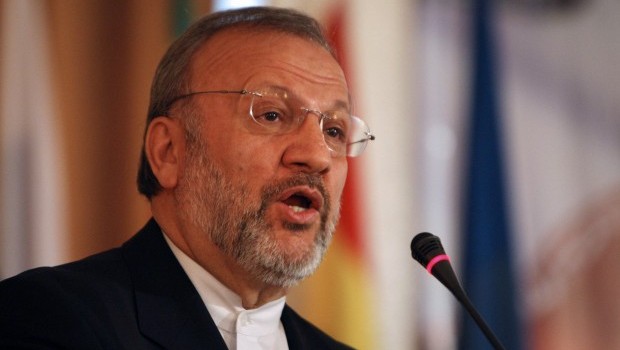London, Asharq Al-Awsat—A former foreign minister has become the first personality to formally declare his candidacy for Iran’s next presidential election in June.
Manouchehr Mottaki made his announcement Tuesday after weeks of dropping hints.
Mottaki claimed that his move has had implicit support from a number of politically powerful ayatollahs including Muhammad-Reza Mahdavi Kani and Muhammad Yazdi. He also promised to publish a program based on “studies carried out by the theological center (howzah) in Qom”.
Mottaki served as foreign minister in President Mahmoud Ahmadinejad’s first administration and was reconfirmed in the second. However, while in Senegal on an official mission, Ahmadinejad dismissed him abruptly soon after winning a second term.
Mottaki joined the Islamic revolution when in his late 20s and was among the first to enlist in the Islamic Revolutionary Guard Corps (IRGC) soon after its formation in 1980. He secured an IRGC scholarship and attended a number of Indian universities where he obtained a doctorate in Political Science. After stints as a member of the Islamic Majlis, the Iranian parliament, Mottaki joined the diplomatic service. He became ambassador to Turkey and then to Japan, ending up as deputy foreign minister.
While in Turkey he was accused of involvement in the murder or abduction of several Iranian exiles and was withdrawn as ambassador.
In the 1990s he joined the pro-reform faction of President Muhammad Khatami for a while before switching sides and supporting Ali Larijani’s presidential bid in 2005. When Larijani lost, Mottaki joined Ahmadinejad’s camp.
Mottaki’s letter of candidacy, addressed to “the people of Iran”, sums up his presidential project in three sections: Absolute obedience to the Supreme Guide, reforming the Iranian administration, and improving the lives of the people in accordance with the wishes of the Supreme Guide.
Under the Islamic Republic’s electoral laws, declaring candidacy does not necessarily mean being accepted to run in the election. Mottaki must apply for candidacy to the Council of the Guardians of the Constitution, a 12-man body reporting to the Supreme Guide. He will become an official candidate only if the council grants its approval; otherwise he will not be allowed to stand.
So far, the only other individual who has spoken of his intention to run is former security and intelligence minister Ali Fallahian, who is wanted by Interpol on charges of involvement in the murder of four Kurdish Iranian exile leaders in Germany in 1992.
Because political parties are not allowed in the Islamic Republic, it is hard to gauge Mottaki’s actual support base. Born in Tehran in 1953, He is virtually unknown among average Iranians. Mottaki has tried to raise his profile with a series of op-eds and speeches lambasting Ahmadinejad’s administration, and charging the president with “harboring secret plans” to destroy the Islamic system.

